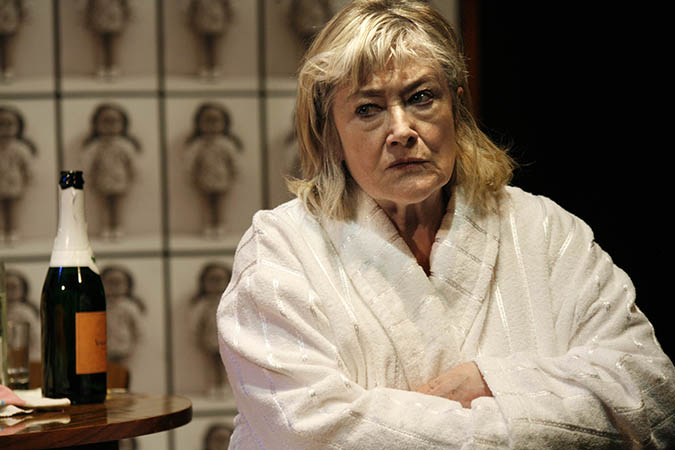Theatr Pena – Riverfront Theatre, Newport
Cast – Christine Pritchard, Hannah O’Leary, Rosamund Shelley & Llinos Daniel
Director – Erica Eirian
Theatr Pena offer their staging of Frank Marcus’ The Killing of Sister George as something of a corrective to the rather lurid treatment of lesbianism presented in Robert Aldrich’s sensationalist film adaptation of1968; yet while their production successfully avoids outdated gay stereotyping, its dramatic impact is diminished somewhat by its polite good taste. The most satisfying aspect of this restaging by Theatr Pena is its sharp focus on the cult of celebrity and prison of fame, which speaks directly to our contemporary culture, but it comes at the cost of a closer examination of the dark sexual dynamics that characterise the lesbian love-triangle – between aging actress June Buckridge, her young lover Childie and television executive Mercy Croft – that forms the centre of this strangely fascinating play.
Sister George is the fictional district nurse of Applehurst – an Archers-type radio soap – who is being killed off by BBC bosses in the hope that the sudden death of a beloved character death will bring huge and welcome publicity to the show. This notional ‘killing’ threatens not only the livelihood of June Buckridge, who has recently risen to late stardom on the back of her alter-ego’s immense popularity, but also the actor’s sense of identity. Indeed, Buckridge has become so synonymous with her role that Childie uses the androgynous nickname of George whenever they are together.
Christine Pritchard’s performance as Buckridge/George is sympathetic, even moving, in its portrayal of an actor’s paranoia and desperation at the loss of a long-standing role. The sense that Buckridge feels herself to be a more important, or even a better person as Sister George is expertly conveyed by Pritchard – the contrast between the avatar of the saintly nurse and the reality of a bitter alcoholic is very well drawn. Pritchard is less convincing, however, in her depiction of the emotional life Buckridge shares with Childie, which is marked by power games of dominance and submission that often descend into physical cruelty. This was possibly down to first-night nerves, which were evident at certain points during the evening, but these power games seemed somewhat muted and not quite as brutal as the text seemed to indicate.
Hannah O’Leary endows Childie with an appropriate blend of guile and innocence, although she never quite plumbs the depths of the character’s submissive tendencies. As a result, Childie’s power games with George take on a light, almost prankish quality, when they should appear as the emotionally abusive psychodramas of two damaged people. Rosamund Shelley, as Mercy Croft, delivers a performance of elegant poise and delicate wit, though she lacks the air of quiet menace that Coral Browne brought to the film version. Llinos Daniel provides warmth and humour in the small role of Eastern-European medium Madame Xenia. Equipped with a flawless accent, Daniel gives dimension to a character that might so easily have been rendered as comic caricature.
Erica Eirian’s production moves along at a good pace, accompanied by an evocative soundtrack of sixties torch-songs sung by the likes of Sandie Shaw and Dusty Springfield. Holly McCarthy’s set and costume design is rich in well-observed period detail. Almost every aspect of the show distils the essence of the sixties; what is lacking is a palpable sense of danger being stirred up by the changes in social and sexual attitudes in that revolutionary decade. For all the faults of the Aldrich film adaptation, it was genuinely ground-breaking in its time. Theatr Pena rightly wanted to curb some of the excesses of the film, but the underplaying of the characters’ psychological brutality toward each other only served to blunt the impact of Marcus’ play.
In recent years Theatr Pena have fulfilled their admirable mission to ‘place women centre stage’ in a number of recent productions of plays by Euripides, Lorca and Genet. In reviving The Killing Sister George they have presented a modern classic with enduring relevance to our celebrity-obsessed age. Yet in order for Theatr Pena to become a truly important company on the Welsh theatre scene, the company will have to be as daring and as challenging in its performances as it is in terms of its programming.
Theatr Pena’s production of The Killing of Sister George plays at the Torch Theatre, Milford Haven on the 14th & 15th March, and at the Galeri in Caernarfon on the 18th March.











